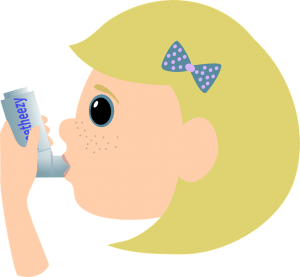Asthma is a respiratory disorder that causes inflammation and constriction of our bodies’ airways. Firstly, according to the CDC, asthma is prevalent in 9.3% of children. Due to the nature of air pollution, environmental conditions are the main trigger of asthma. However, asthma is often triggered by other factors as well. For example, you may have a pet in the home that is causing a reaction in your child. Learn how to manage asthma by pinpointing triggers and treating symptoms.
Asthma Symptoms
- Coughing
- Wheezing
- Shortness of breath
- Chest tightness
- Trouble sleeping due to coughing/wheezing
Firstly, most children with asthma develop symptoms by the age of five. As it turns out, people with asthma often have allergies, too. You may need to see an allergist or immunologist if your child is fatigued, having problems eating/breathing, or experiencing worse symptoms during or after exercise. Make an appointment with your pediatric healthcare provider to help you to determine if your child needs to see an allergist or immunologist.
Also, take note of when your child is experiencing symptoms to report to your healthcare practitioner. Symptoms may occur at night or early in the morning, or during or after exercise. They may also occur during certain seasons, after laughing or crying, or when exposed to specific triggers. Create a journal of these events in order to better determine what is triggering your child’s asthma.
Asthma Triggers
- Allergens (mold, pollen, mites, dust)
- Viral illness
- Cold Air
- Exercise
- Emotional Stress
- Heredity
- Chemicals/Food Additives (shellfish, nuts, wheat, dairy, sulfites used in food preservation, food colorings)
Medications
Using certain medications can be controversial, yet many kids need it. If you think you may require asthma medication for your child, make an appointment with your pediatric healthcare provider.
 Bronchodilators
Bronchodilators
Firstly, bronchodilators are used as “rescue” medications for kids with asthma. This medication dilates inflamed bronchial tubes so your kid can breathe appropriately. It is usually inhaled during an attack or used before exercising. This medication works within minutes and can last for a few hours.
Corticosteroids
Secondly, corticosteroids are used as long-term medications and are referred to as “controller meds”. Use these regularly to control inflammation in the bronchial tubes. Many use corticosteroids daily in order to control their conditions.
Use medications in combination or alone to treat varying severities of asthma.
Prevention
- Avoid pollution (cigarette smoke, aerosol sprays, smog) and pet dander.
- Limit food additives and processed foods like fried foods and sweeteners.
- Avoid nitrites and sulfites found in some foods. Those sensitive to sulfites may benefit from Vitamin B12 and molybdenum supplements.
- Exercise! Try aerobic exercise, resistance training, yoga, or stretching. Avoid exercising in cold, dry, or humid air.
- Take omega-3 fatty acids (flaxseed oil, fish oil) to decrease inflammation.
- Eat foods with antioxidants for an anti-inflammatory effect.
- Supplement with magnesium for a broncho-dilating effect.
- Avoid developing resistance to albuterol. Try maintenance therapy.
Going forward, develop an asthma action plan with your child. Most importantly, we encourage open communication between parents and kids. Talk to your child about how to protect from attacks in the future.
In conclusion, respond to this post or contact us for any questions or comments. And check out Shaklee’s Natural Cleaning Products to help keep your system healthy!




